Get ideas about the best chives companion plants you can surround your chives with to help them thrive and produce bountiful crops. Learn what you can plant next to chives and what you should not plant near chives. Get ideas about which flowers grow well with chives, which herbs grow well with chives, which fruit grows well with chives, and which vegetables grow well with chives.
Whether you live in the United States, Canada, the UK, or anywhere else, you can find out about the best place to plant chives, the best fertilizer for chives, and whether chives need a lot of water. I’ve been growing and harvesting chives for over 20 years, using them in recipes and as garnishes. If you are looking for a delicious, deer-resistant addition to your plant collection, read on to learn how simple it is to grow chives in your garden. Get a handy chart listing companion plants for chives as well.
Table of Contents
Why I Love Growing Chives
Where I live in the Pacific Northwest, we get a lot of deer coming through our property. We have avoided putting up a tall fence around our vegetable garden because of the need to till the ground with the tractor. For now, I use a lot of bird netting for our blueberries and try spraying deer repellent on the beans. What I really love is to plant things that deer with avoid, and chives are one of my favorite all-purpose deer-resistant plants because they are decorative as well as edible. In addition to the chives in our vegetable garden, I have chives planted in the perennial garden and in other locations around the yard as well. Chives are easy to divide and make a good filler plant in a border. They are versatile and easy to grow. I love being able to nip outside to snip some chives to use in recipes, especially the breakfast recipes we make with eggs from our chickens. Just a sprinkle of a few chives can add amazing flavor to a dish. Can you tell I am a huge fan? Read on to learn more about this perennial favorite and what grows well alongside of it.
What Makes a Good Companion Plant?
Why pay attention to companion plants? A good companion plant is one that offers various benefits to its neighboring plants, such as minimizing pest and disease issues, which helps enhance their growth, health, and overall productivity. Here are some key qualities that make a good companion plant that will help you plant strategically to make the most of your yard or garden space:
Pest Control: Companion plants may repel pests or attract beneficial insects that prey on pests, helping to reduce pest damage without the need for chemical pesticides.
Pollinator Attraction: Plants that attract pollinators such as bees, butterflies, and hummingbirds can improve pollination and fruit set in neighboring plants, leading to higher yields.
Soil Improvement: Some companion plants have deep roots that help break up compacted soil, while others fix nitrogen or add organic matter to the soil, improving soil fertility and structure for neighboring plants.
Complementary Growth Habits: Companion plants with different growth habits, such as tall plants providing shade for shorter ones or ground covers suppressing weeds, can maximize space and resources in the garden.
Disease Resistance: Certain companion plants may emit chemicals or compounds that inhibit the growth of pathogens or pests, reducing the risk of disease in neighboring plants.
Seasonal Considerations: Companion plants that thrive during different seasons can provide continuous benefits throughout the year, such as early bloomers attracting pollinators or cover crops protecting soil during the off-season.
Aesthetic Value: Companion plants with attractive foliage, flowers, or fruits can enhance the visual appeal of the garden while providing practical benefits to neighboring plants.
Chives Companion Flowers
By planting these companion flowers alongside chives, you can create a biodiverse and pest-resistant garden ecosystem that supports healthy chive growth and enhances overall yields. Here are some excellent companion flowers for chives and the reasons why they work well together:
Alyssum (Lobularia maritima): Alyssum flowers attract beneficial insects like predatory wasps and hoverflies, which feed on pests like aphids and caterpillars that can harm chive plants. Their low-growing habit makes them ideal ground cover, suppressing weeds and conserving soil moisture.
Calendula (Calendula officinalis): Calendula flowers attract beneficial insects such as ladybugs and lacewings, which prey on pests like aphids and caterpillars that can harm chive plants. Additionally, calendula adds bright color to the garden and can be used for medicinal and culinary purposes.
Cosmos (Cosmos spp.): Cosmos flowers attract pollinators such as bees and butterflies, which can enhance chive yields. Additionally, cosmos add height and color to the garden, creating visual interest.
Marigolds (Tagetes spp.): Marigolds repel pests such as nematodes, aphids, and flea beetles, which can harm chive plants. Planting marigolds around chives can help protect them from infestation while adding vibrant color to the garden.
Nasturtiums (Tropaeolum majus): Nasturtiums are great companions for chives because they deter pests like aphids, whiteflies, and cucumber beetles, which can damage chive plants. Their trailing habit also provides ground cover, suppressing weeds and conserving soil moisture.
Chives Companion Fruit
Chives can benefit from companion fruit plants that provide various advantages such as pollination support, pest control, and aesthetic appeal. Here are some excellent companion fruit plants for chives and the reasons why they make good companions:
Apple Trees (Malus domestica): Apple trees attract pollinators such as bees, which can help increase chive yields. Additionally, chives may help repel pests that can harm apple trees, creating a mutually beneficial relationship.
Berry Bushes (e.g., Raspberry, Blackberry, Blueberry): Berry bushes provide food and habitat for beneficial insects and birds, which can help control pests in the garden. Chives, with their aromatic foliage, may also help repel certain pests that could affect berry bushes.
Currant Bushes (Ribes spp.): Currant bushes attract pollinators and beneficial insects while providing shade and wind protection for chives. Chives, in turn, may help deter pests that can damage currant bushes, promoting a healthier growing environment.
Grapevines (Vitis spp.): Grapevines benefit from the presence of chives, which may help repel pests and attract pollinators. Chives can also help suppress weeds and conserve soil moisture around grapevines, improving growing conditions.
Peach Trees (Prunus persica): Peach trees provide shade and wind protection for chives, creating a microclimate that supports healthy plant growth. Chives may also help deter pests that can damage peach trees, contributing to overall plant health.
Pear Trees (Pyrus spp.): Pear trees also attract pollinators and can benefit from the presence of chives for increased pollination. Chives may also help deter pests that can damage pear trees, contributing to overall plant health.
Plum Trees (Prunus domestica): Plum trees attract pollinators and can benefit from the presence of chives for increased pollination. Chives may also help repel certain pests that could affect plum trees, promoting a healthier growing environment.
Chives Companion Herbs
When you plant companion herbs alongside chives, you can create pest-resistant garden ecosystem enhances overall yields of both herbs. Here are some excellent companion herbs for chives and the reasons why they work well together:
Basil (Ocimum basilicum): Basil emits a strong aroma that deters pests like aphids, thrips, and spider mites, which can damage chive plants. Interplanting basil with chives can help protect against these pests while providing a flavorful and versatile culinary herb.
Chamomile (Matricaria chamomilla): Chamomile attracts beneficial insects such as hoverflies and parasitic wasps, which prey on pests that can damage chive plants. Its delicate flowers add beauty to the garden while providing practical benefits.
Cilantro (Coriandrum sativum): Cilantro attracts beneficial insects such as lacewings and parasitic wasps, which feed on pests like aphids and spider mites that can harm chive plants. Its feathery foliage also provides shade and moisture retention for chive plants.
Lavender (Lavandula spp.): Lavender is a fantastic companion for chives because it attracts pollinators such as bees and butterflies, which can help increase chive yields. Additionally, lavender’s aromatic foliage can help repel pests like aphids and spider mites, benefiting chive plants.
Parsley (Petroselinum crispum): Parsley attracts beneficial insects such as hoverflies and parasitic wasps, which prey on pests like aphids and caterpillars that can harm chive plants. Additionally, parsley adds visual interest to the garden with its lush foliage and delicate flowers.
Rosemary (Rosmarinus officinalis): Rosemary repels pests such as carrot flies and cabbage moths, which can harm chive plants. Additionally, rosemary’s aromatic foliage can help mask the scent of chives, making them less attractive to pests.
Thyme (Thymus spp.): Thyme emits a strong scent that repels pests like cabbage worms and slugs, which can damage chive plants. Interplanting thyme with chives can help protect them from infestation while providing a drought-tolerant and aromatic herb for culinary use.
Chives Companion Vegetables
Planting companion vegetables alongside chives supports healthy plant growth. Here are some beneficial companion vegetables for chives and the reasons why they make good companions:
Beans (Phaseolus spp.): Chives and beans are compatible companions in the garden, with chives helping to repel pests like aphids, spider mites, and bean beetles. Additionally, chives can attract beneficial insects that prey on bean pests, contributing to pest control in the garden.
Carrots (Daucus carota): Chives are believed to improve the flavor of carrots when grown together. Furthermore, chives can help repel pests such as aphids, carrot flies, and onion flies, which can damage carrot plants.
Lettuce (Lactuca sativa): Chives and lettuce have similar growing requirements, making them compatible companions in the garden. Interplanting chives with lettuce can help deter pests like aphids and slugs while providing additional flavor and nutrition to salads.
Peppers (Capsicum spp.): Chives are beneficial companions for peppers as they help repel pests like aphids, spider mites, and thrips. Additionally, chives attract beneficial insects such as hoverflies and predatory wasps, which prey on pepper pests, contributing to pest control in the garden.
Radishes (Raphanus sativus): Radishes are quick-growing and can help break up compacted soil around chive plants, improving soil aeration and drainage. Additionally, chives can help repel pests such as flea beetles and aphids, which can damage radish plants.
Spinach (Spinacia oleracea): Chives and spinach have complementary growth habits and can be interplanted to maximize space in the garden. Chives may help repel pests like aphids and spider mites that can harm spinach plants, contributing to pest control in the garden.
Tomatoes (Solanum lycopersicum): Chives are beneficial companions for tomatoes as they help repel pests like aphids, spider mites, and tomato hornworms. Additionally, chives attract beneficial insects such as hoverflies and parasitic wasps, which prey on tomato pests, contributing to pest control in the garden.
What Not to Plant with Chives
Thankfully, the list of things to avoid planting with chives is short. Brassicas like cabbage, broccoli, and cauliflower may not grow well near chives. Chives emit natural compounds that may inhibit the growth of brassicas.
Chives Companion Planting Chart
| Chives Companion Plants | |
| Chives Companion Plants: Flowers | Chives Companion Plants: Fruit |
| Alyssum | Apples |
| Calendula | Blackberries |
| Cosmos | Blueberries |
| Marigolds | Currants |
| Nasturtiums | Grapevines |
| Peach trees | |
| Chives Companion Plants: Herbs | Pear trees |
| Basil | Plum trees |
| Chamomile | Raspberries |
| Cilantro | |
| Lavender | Chives Companion Plants: Vegetables |
| Parsley | Beans |
| Rosemary | Carrots |
| Thyme | Lettuce |
| Peppers | |
| Worst Chives Companion Plants | Radishes |
| Broccoli | Spinach |
| Cabbage | Tomatoes |
| Cauliflower | |
Common Questions About Planting and Growing Chives
How should chives be planted?
Chives can be planted in well-drained soil with full sunlight. Plant seeds or transplant seedlings about 1/4 inch deep and 6 inches apart. Water regularly, but avoid overwatering. Harvest by cutting leaves from the base when they reach about 6 inches tall, leaving some for regrowth.
Should I let my chives flower?
Allowing chives to flower is optional. Flowering can attract pollinators, but it can also reduce the flavor of the leaves. If you prefer stronger-flavored chives, it’s best to trim off the flowers as they appear.
Do chives grow back every year?
Yes, chives are perennial plants, meaning they will regrow each year under the right conditions. With proper care and maintenance, chive plants can continue to produce leaves for several years.
What is the best fertilizer for chives?
Chives typically don’t require heavy fertilization. A balanced, slow-release fertilizer with equal parts nitrogen, phosphorus, and potassium can be applied sparingly in early spring. Alternatively, organic options like compost or well-aged manure can provide nutrients without the risk of over-fertilization.
How much water do chives need?
Chives prefer consistently moist soil but are sensitive to overwatering. Water them thoroughly when the top inch of soil feels dry, but allow the soil to dry out slightly between waterings to prevent root rot. Generally, chives need about 1 inch of water per week, but this can vary depending on climate and soil conditions.
How much sun do chives need?
Chives thrive in full sunlight, meaning they require at least 6 hours of direct sunlight per day. However, they can tolerate partial shade, especially in hot climates. Providing adequate sunlight ensures robust growth and flavorful leaves.
What kind of soil do chives need?
Chives prefer well-draining soil with a slightly acidic to neutral pH (around 6.0 to 7.0). A rich, fertile soil with good organic matter content promotes healthy growth. Adding compost or aged manure to the soil can improve its texture and fertility, providing an ideal growing medium for chives.
Need More Planting Ideas?
Check out the tips for the best companion plants for eggplant to learn what to grow with those beauties. If you like the idea of companion planting, you might be interested in reading about the best companion plants for pumpkins, sunflowers, garlic, asparagus, rosemary, beetroot (beets), or the best companion plants for lavender. Get tips for growing stunning dahlias. Are you a beginning gardener? Try planting some foolproof, easy-care perennials, or learning about the best companion plants for columbine. There are so many exciting plants to grow!
Keep Track of Your Garden with a Journal Logbook
Now that you have learned about some compatible companion plants, keep track of your planting ideas, goals, and plans with a free garden journal logbook. Choose the pages you want to print and customize them as you wish to record monthly, weekly, and daily garden tasks, lists, weather, and planting arrangements. There are also grid pages for easily designing the layout of your vegetable garden, flower garden, or landscape. Print it out and put it into a notebook you can take with you to the garden (that’s what I do). It’s nice to have all of your garden information in one place.
Free Online Garden Planner Layout Template
Now that you know which are the best companion plants for chives, you might need a way to plan your garden layout. Whether you are planting vegetables, flowers, or herbs near your chive plants, this online garden planner can help you visualize your design and bring it to life. With garden tasks that need your attention, this is one way to save time.
It’s fully customizable when you make your own copy and includes two editable chart pages for noting planting specifications.
Get my free online garden layout planner template!
Organize Your Garden Tasks with a Free Garden Planner Notebook
As a result of needing to keep track of garden tasks throughout the year, I decided to begin a garden planner notebook. It has a page for each month, along with notes pages. If a garden planner notebook seems like a good idea to you, good news! You can get it here!
Get the garden notebook!
Have a wonderful week, and may all of your chive-growing endeavors meet with success!

Lisa Mitchell is a wife, mom, and school librarian who likes to grow fruit, herbs, vegetables, and flowers on her family’s small Pacific Northwest farm. To learn more about what this website has to offer gardeners, click on over to the Garden page.
Like what you read here? Please give it a share!
Want more great garden, food, or travel ideas? Follow FluxingWell on Pinterest, Facebook, Instagram, and X for the latest posts, tips, and inspiration.


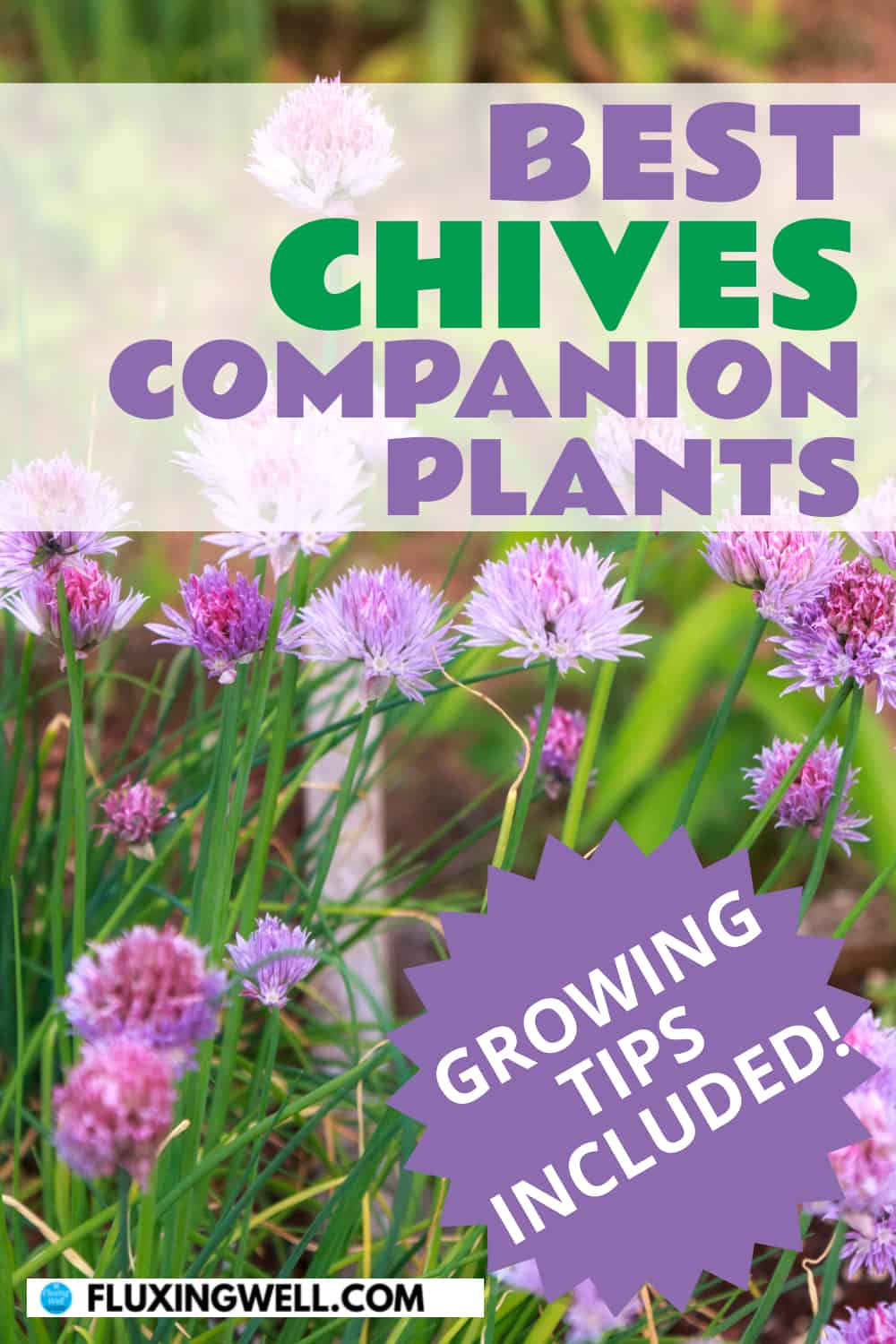
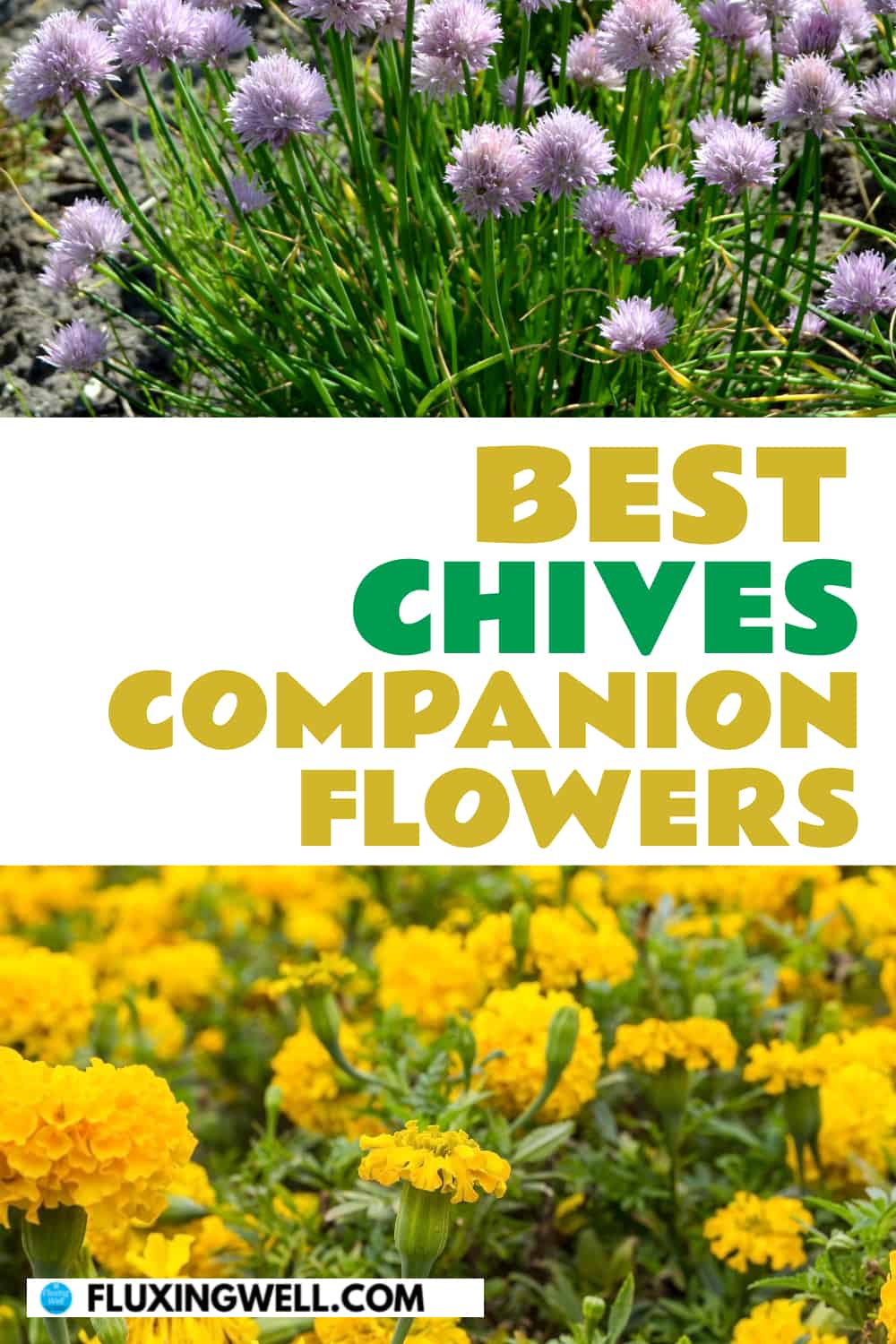
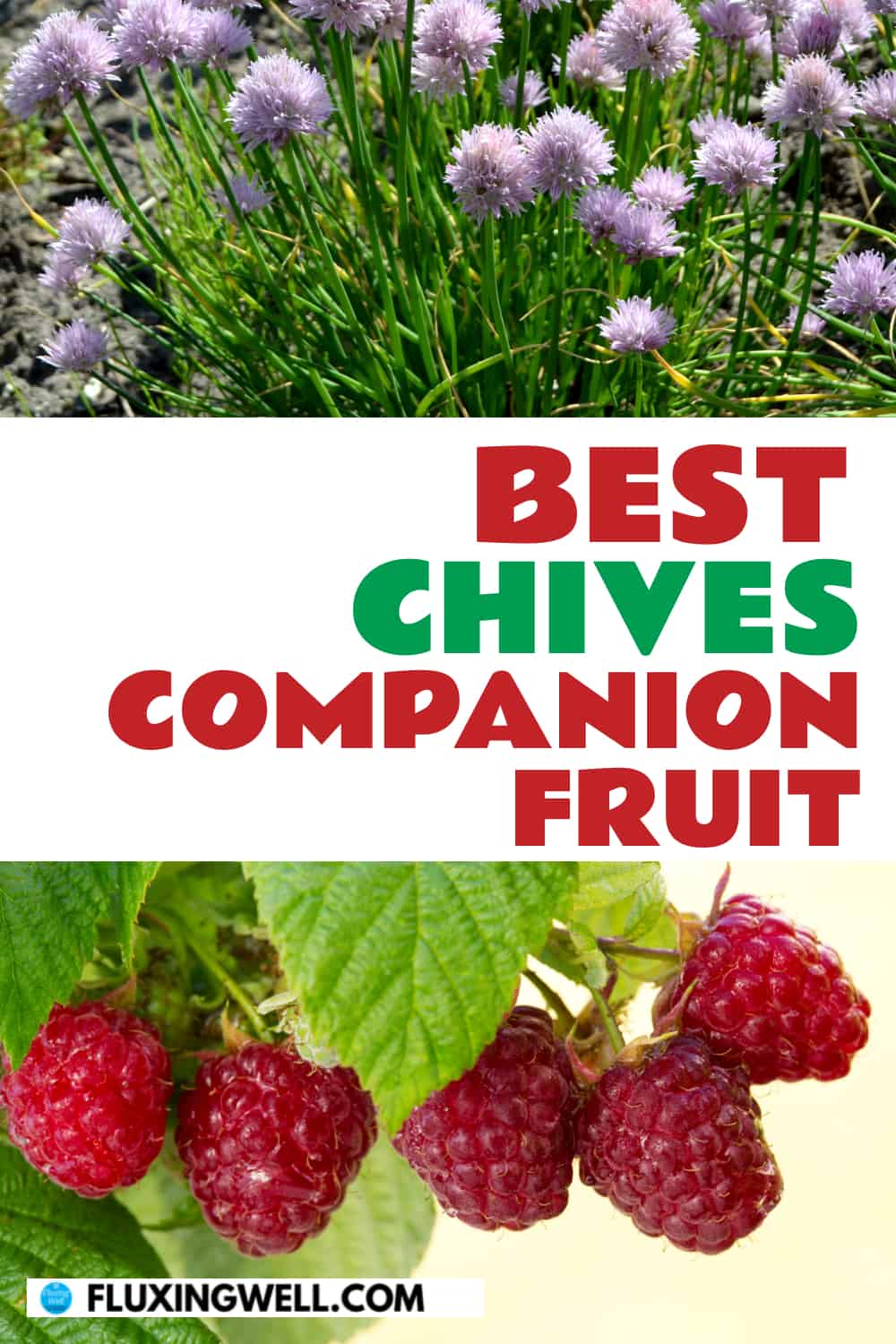
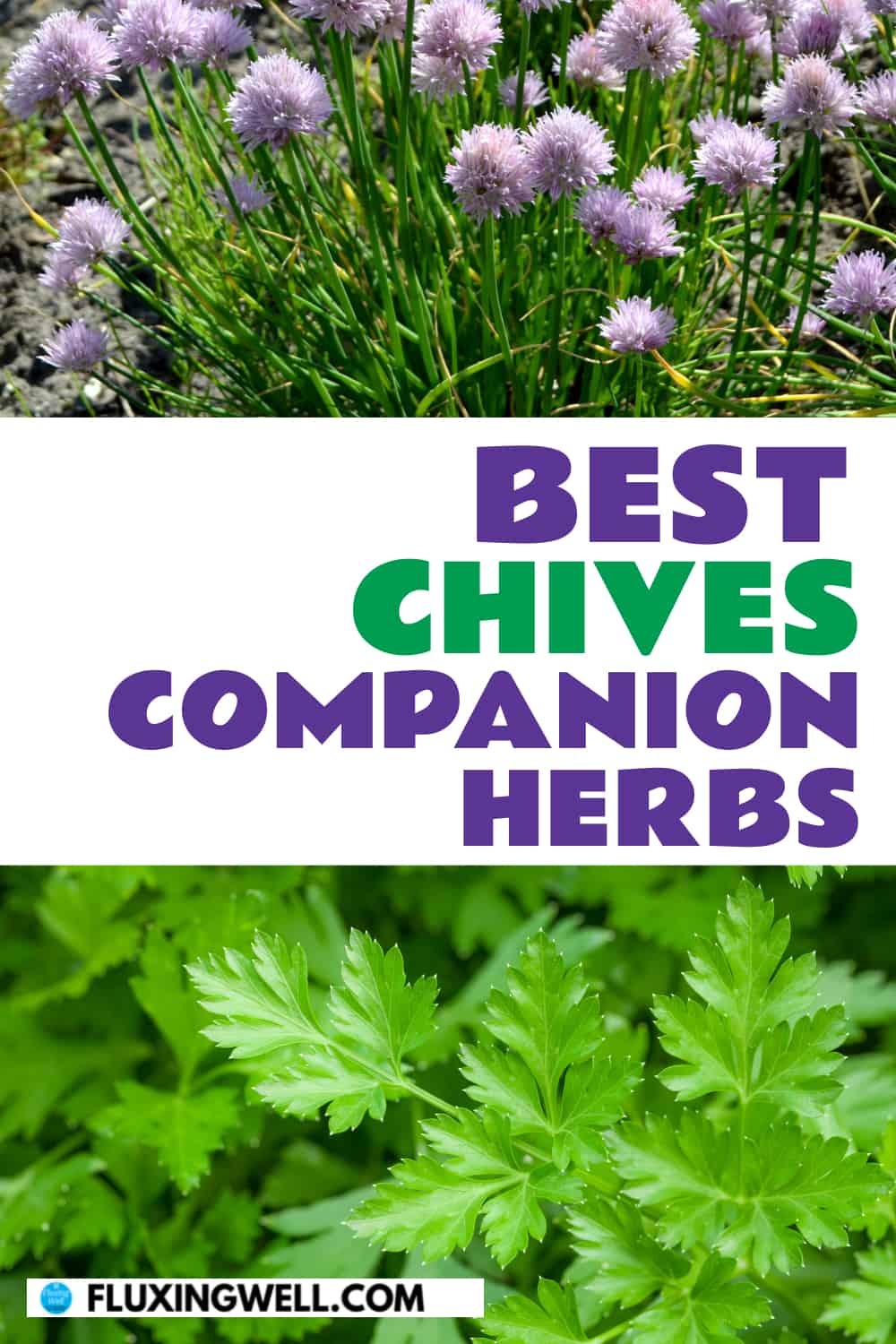
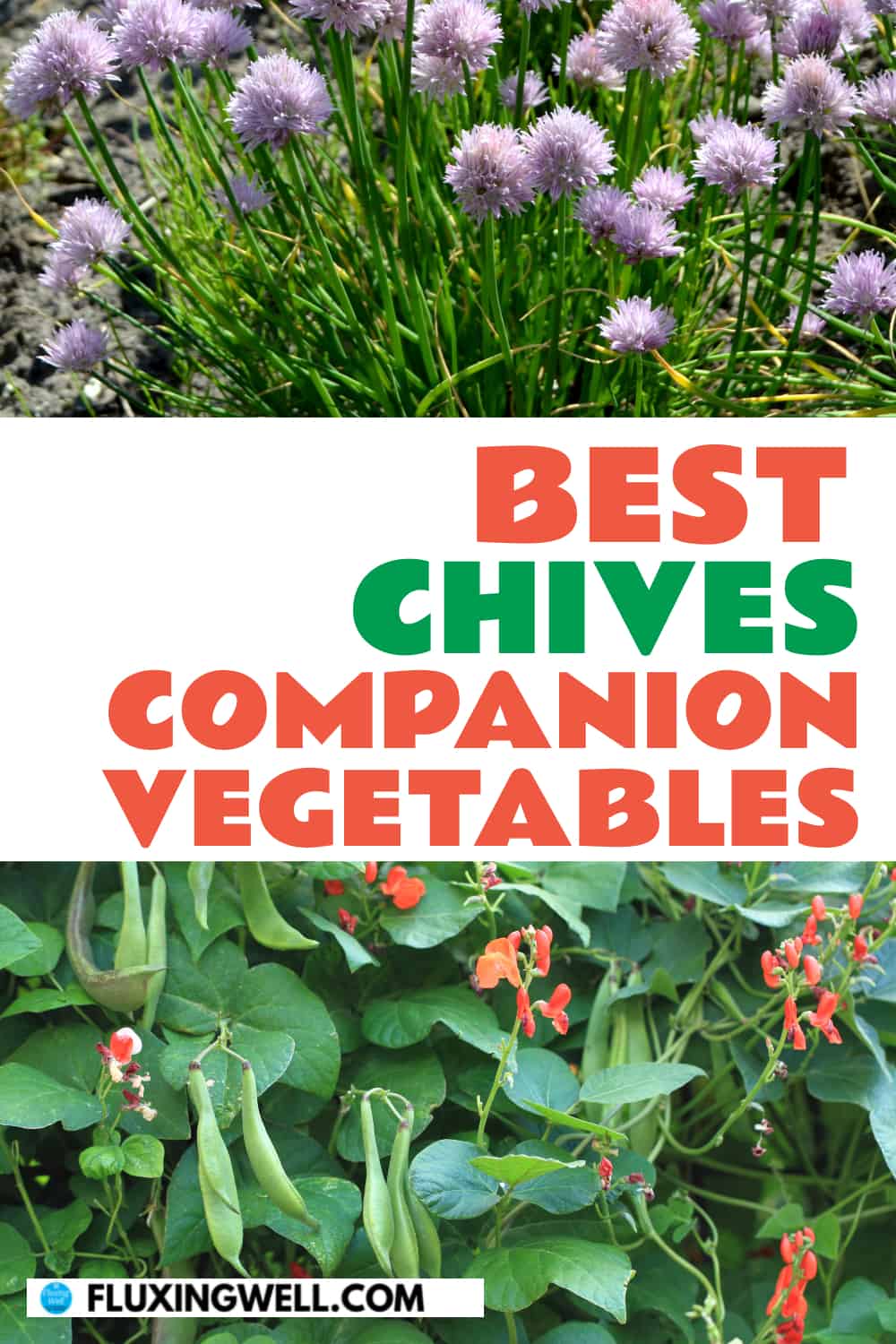
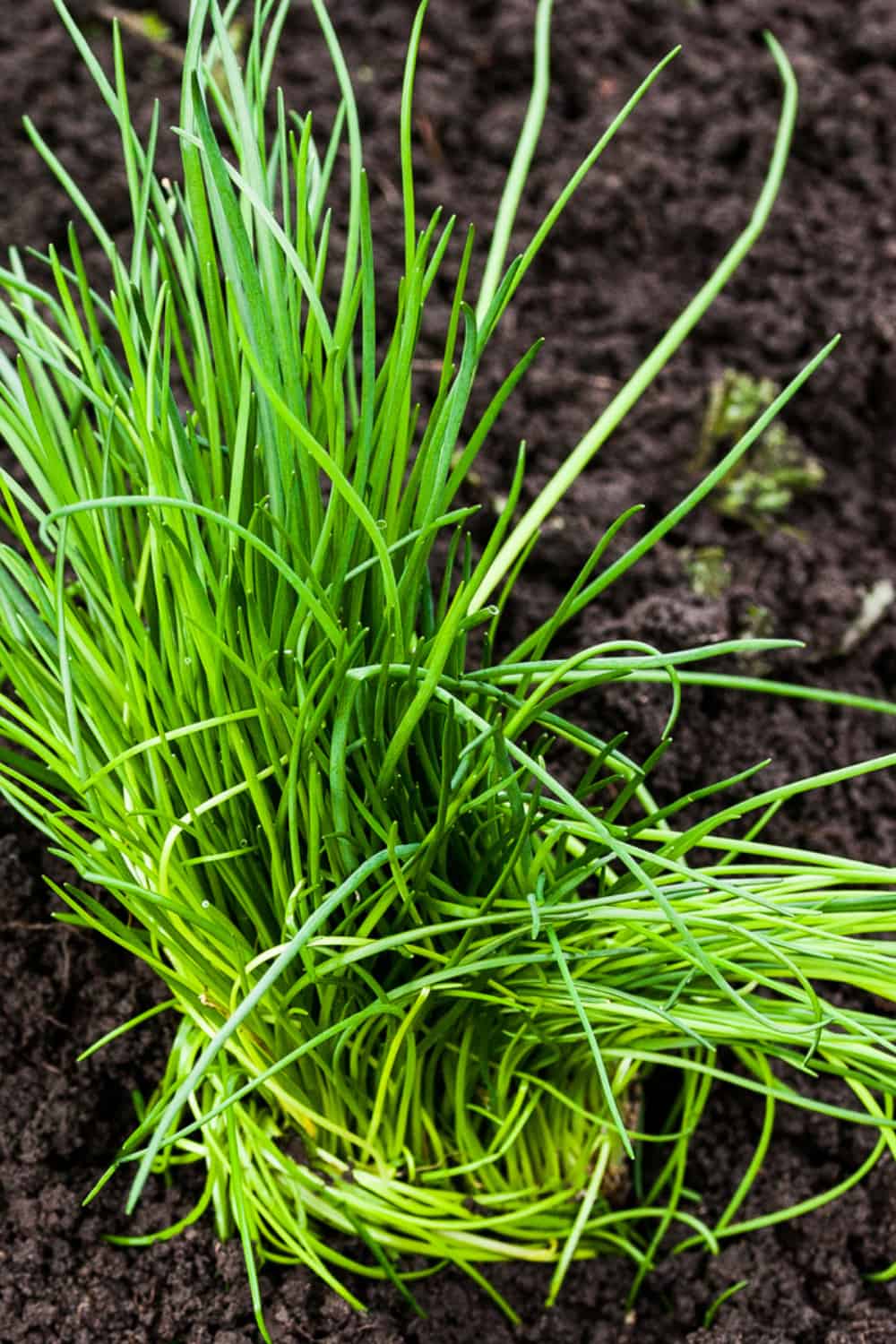


Fabulous information on the best chives companion plants. I love all the wonderful growing tips included and looking forward to trying some lavender plants alongside the chives.
Great! Both lavender and chives are disliked by deer, so should do well together.
Thanks for this detailed and helpful article about chives companion plants, Lisa! I didn’t know that there were so many options. Thanks for sharing!
You are most welcome. Chives are definitely versatile as a culinary herb and a decorative floral plant.